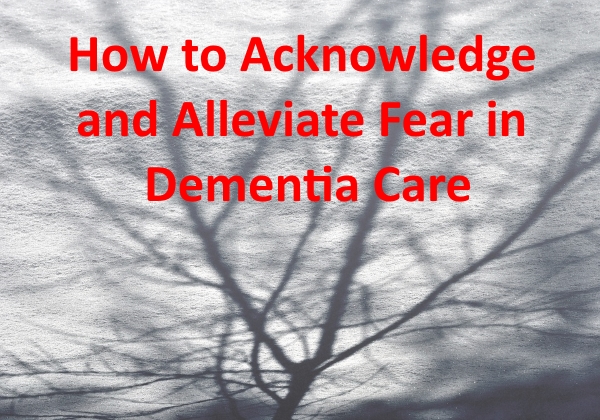Contributing Writer: Julie Bigham, Owner Joy Filled Visits, LLC

Fear is real, even when it’s not
Sitting around the dinner table several years ago I opened a birthday card from my daughter-in-law, and as I stared at what should have been a simple birthday greeting, I realized I couldn’t make out the message. I turned that card over and around several times, but the words just didn’t make any sense.
I quickly started to panic as I thought surely I must have had some type of stroke that inhibited my ability to read. But as I looked across the table and saw her smiling face, I realized the card was written in her native Russian language. The potential crisis was averted, but I learned a valuable lesson about fear. It’s real, even if it’s not.
When you care for a loved one living with Alzheimer’s or another dementia, some of the things they say and do may not make sense, TO YOU. They may begin to refuse a shower or cling to your hand while walking a familiar path.
But what may not make sense to you may make perfect sense to them. Perhaps the water splashing in their face is annoying or they are afraid of slipping in the tub. Maybe shadows on the sidewalk look more like holes they might fall in to.
As a caregiver it is important to retrain your brain to see situations from more than one perspective.
Here is an example from my own personal experience! One afternoon I was startled by horrific screams coming from the room of Ms. S. As I ran from my office, I was met by staff from all over the facility running in the same direction.
When we reached her room, Ms. S. was yelling for us to save her roommate because men were shooting her. We knew this wasn’t possible, but to Ms. S., it was real.
Can you guess what was happening? There was a western playing on the TV. A simple channel change, and all was right on South Wing again!
More recently I had a resident ask me to take her home. This actually happens quite often in memory care, as residents ask for help to find their car, their room, or their family. Per my usual attempt to assist, I walked the resident to her room pointing out the familiar items that make it home.
She was satisfied briefly, but then asked again 30 minutes later if I would take her home. I began to walk her toward her room a second time when she stopped me and said, “honey, I’m really scared to stay here.”
The word scared further triggered my compassion button, as I realized this wasn’t just about wanting to go home, this was different. I stopped and hug this sweet lady, looked her in the eye and said, “well, let’s talk about that”.
I grabbed the 2nd shift nurse and together we talked with this resident about her fear and assured her that the nurse would be there to help her.
She didn’t need home, she needed someone to listen. I realized then that even though I couldn’t take her to the home she loves, I could alleviate the fear she was feeling, and that is success!
I truly believe that a lot of the challenging behaviors we face as caregivers stem directly from fear, real or imagined. We must understand that even the imagined fear, is real to those living with Alzheimer’s.
If you can determine the cause of the fear and eliminate it, you may also eliminate the challenging behavior. So put on your detective cap and search for the clues that can lead you directly to the source of fear, then work to alleviate that fear!
You might even enjoy the challenge.
For more tips, tools and personal stories from Julie, check out her Joy Filled Visits Kit, Maximizing Family Time in the Midst of Alzheimer’s at http://julsbigham.wixsite.com/jfv-kit/services.
To order a Joy Filled Visits Kit, email julsbigham@yahoo.com. Mention TinT in the email and receive a special discounted price of $59.00 + shipping/handling.
 About the Author: Julie Bingham is the owner of Joy Filled Visits, LLC.
About the Author: Julie Bingham is the owner of Joy Filled Visits, LLC.
She has a passion for bringing joy to the lives of senior adults and for providing motivation and support to professional and family caregivers.
Julie designed the Joy Filled Visits Kit to help families maximize their time with a loved one living with Alzheimer’s whether they are living at home or in a facility.
Each step builds on the next to assist in the creation of a simple plan that will keep the whole family engaged and assure that visits are filled with positive interaction and great fun.
If you like what you’ve read, why not receive periodic updates when you:
Subscribe to the TinT Newsletter
Do you have a loved one or client who has experience fear as a result of their disease? Please share your experience or tips/strategies in the comments below:





Thanks for sharing this insight, Julie. Caregiving for a senior with Alzheimer’s can be quite challenging. I’ve read about music therapy, and how it helps reduce fear and anxiety in seniors with dementia. Perhaps you could look into that?
I appreciate your comment Jannette. BTW, I have a handful of resources on using music in dementia care. I can’t recall one specifically addressing fear, however. http://togetherinthis.com/?s=music
Thank you….I have alzheimers